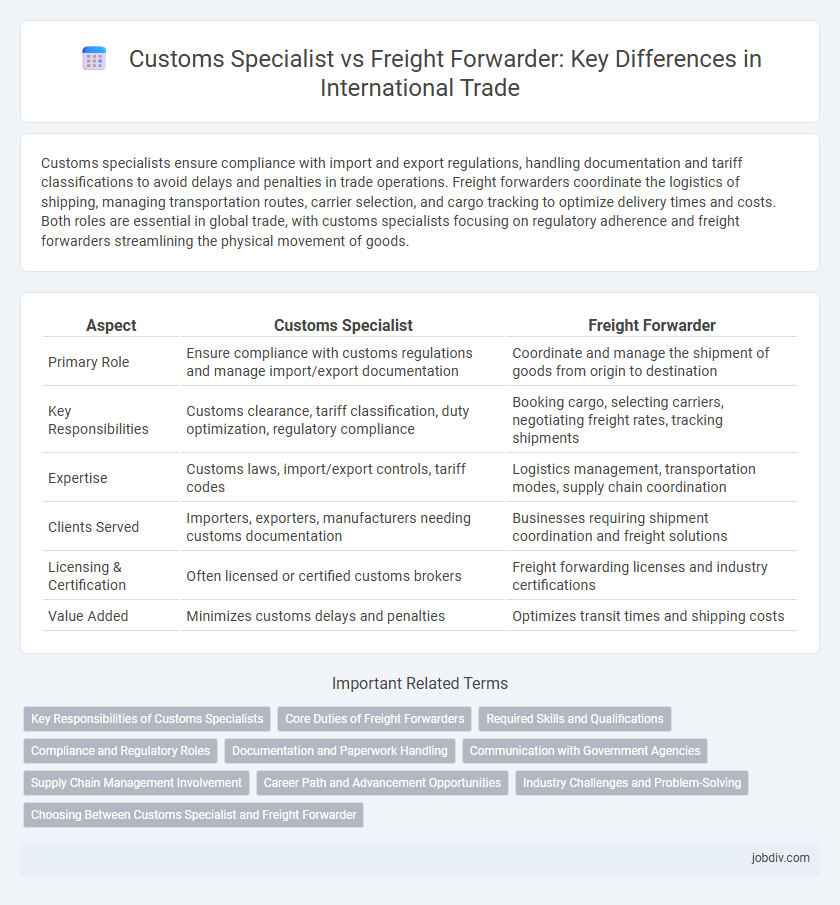Customs specialists ensure compliance with import and export regulations, handling documentation and tariff classifications to avoid delays and penalties in trade operations. Freight forwarders coordinate the logistics of shipping, managing transportation routes, carrier selection, and cargo tracking to optimize delivery times and costs. Both roles are essential in global trade, with customs specialists focusing on regulatory adherence and freight forwarders streamlining the physical movement of goods.
Table of Comparison
| Aspect | Customs Specialist | Freight Forwarder |
|---|---|---|
| Primary Role | Ensure compliance with customs regulations and manage import/export documentation | Coordinate and manage the shipment of goods from origin to destination |
| Key Responsibilities | Customs clearance, tariff classification, duty optimization, regulatory compliance | Booking cargo, selecting carriers, negotiating freight rates, tracking shipments |
| Expertise | Customs laws, import/export controls, tariff codes | Logistics management, transportation modes, supply chain coordination |
| Clients Served | Importers, exporters, manufacturers needing customs documentation | Businesses requiring shipment coordination and freight solutions |
| Licensing & Certification | Often licensed or certified customs brokers | Freight forwarding licenses and industry certifications |
| Value Added | Minimizes customs delays and penalties | Optimizes transit times and shipping costs |
Key Responsibilities of Customs Specialists
Customs Specialists ensure compliance with international trade regulations by preparing and submitting accurate documentation required for importing and exporting goods. They classify products according to tariff schedules and work closely with government agencies to resolve customs clearance issues efficiently. Their expertise reduces delays, prevents penalties, and facilitates smooth cross-border trade operations.
Core Duties of Freight Forwarders
Freight forwarders coordinate the efficient movement of goods by managing transportation logistics, negotiating freight rates, and preparing necessary shipping documentation such as bills of lading and customs declarations. They act as intermediaries between shippers and carriers to ensure timely delivery while optimizing routes and compliance with international trade regulations. Core duties also include tracking shipments, arranging insurance, and providing valuable insights on customs requirements to facilitate smooth clearance processes.
Required Skills and Qualifications
Customs Specialists require in-depth knowledge of trade regulations, tariff codes, and compliance procedures, often holding certifications such as the Certified Customs Specialist (CCS) or Licensed Customs Broker. Freight Forwarders must possess strong logistics management skills, expertise in international shipping documentation, and experience with carrier negotiation and route optimization. Both roles demand proficiency in customs software and exceptional attention to detail to ensure accurate clearance and efficient goods movement across borders.
Compliance and Regulatory Roles
Customs Specialists ensure strict adherence to import-export laws and regulations by managing documentation, tariff classifications, and duty payments, minimizing legal risks and penalties. Freight Forwarders coordinate the logistics of shipments, including carrier selection and route planning, but rely on Customs Specialists for compliance with customs regulations and clearance processes. Effective trade operations require seamless collaboration where Customs Specialists focus on regulatory compliance while Freight Forwarders optimize transportation and delivery efficiency.
Documentation and Paperwork Handling
Customs specialists ensure accurate compliance with import-export regulations by meticulously reviewing and preparing customs documentation, such as commercial invoices, bills of lading, and certificates of origin. Freight forwarders coordinate the overall logistics and manage a broad range of shipping documents, including airway bills and packing lists, to ensure smooth shipment movement through different carriers and countries. Effective documentation handling by both roles is critical to avoid delays, penalties, and maximize trade efficiency.
Communication with Government Agencies
Customs specialists maintain direct communication with government agencies to ensure compliance with import and export regulations, facilitating the accurate processing of shipment documentation. Freight forwarders coordinate with customs specialists and relevant authorities to streamline cargo clearance and manage logistical challenges effectively. Clear communication with agencies like customs, agriculture, and inspection services is essential for both roles to prevent delays and ensure regulatory adherence.
Supply Chain Management Involvement
Customs specialists ensure compliance with import and export regulations, facilitating the smooth clearance of goods through customs authorities and minimizing delays in the supply chain. Freight forwarders coordinate the logistics of transportation, warehousing, and distribution, optimizing routes and modes to reduce transit time and costs within supply chain management. Both roles are critical in managing international trade operations, with customs specialists focusing on regulatory adherence and freight forwarders on efficient cargo movement.
Career Path and Advancement Opportunities
Customs Specialists primarily focus on regulatory compliance, ensuring shipments meet government requirements and facilitating smooth border crossings, which leads to career advancement through certifications like the Certified Customs Specialist (CCS) and progression into compliance management or government consulting roles. Freight Forwarders manage the logistics of shipping goods internationally, offering broader career paths in supply chain management, operations coordination, and global trade strategy, with advancement opportunities often tied to gaining expertise in international shipping regulations and multimodal transport. Both careers benefit from continuous education and gaining experience in international trade laws, but Freight Forwarders typically have more diverse roles allowing for growth into higher-level logistics and supply chain leadership positions.
Industry Challenges and Problem-Solving
Customs specialists navigate complex regulatory frameworks to ensure compliance with import-export laws, mitigating risks of delays and fines. Freight forwarders optimize logistical chains, managing transportation, documentation, and coordination between carriers to streamline cargo movement. Both roles address challenges like fluctuating tariffs, border security issues, and supply chain disruptions by leveraging expertise in documentation accuracy and efficient routing strategies.
Choosing Between Customs Specialist and Freight Forwarder
Choosing between a customs specialist and a freight forwarder depends on the complexity of import and export regulations as well as logistical needs. Customs specialists offer deep expertise in tariff classifications, compliance with international trade laws, and duty optimization, ensuring smooth customs clearance. Freight forwarders provide comprehensive shipment management, including transportation coordination, warehousing, and cargo tracking, making them ideal for end-to-end supply chain solutions.
Customs Specialist vs Freight Forwarder Infographic

 jobdiv.com
jobdiv.com